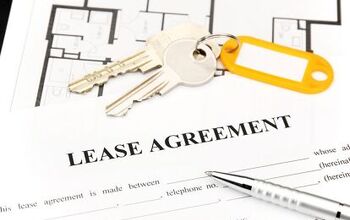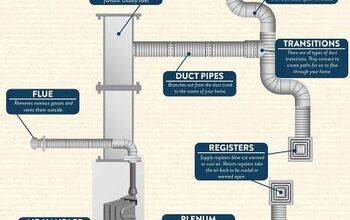Can A Landlord Break A Lease To Sell Property? (Find Out Now!)

Coming home to find a notice on your door that you have 30 or 60 days to vacate is terrifying. The situation is even worse when you find out that your landlord is selling the property. So many questions go through your mind, and you suddenly feel like you’re about to be homeless. Can a landlord really break a lease to sell the property?
Your landlord can break the lease to sell the property. The lease needs to have a clause giving the landlord the right to terminate early if the property is sold. State laws require landlords to give at 30- or 60-day notice to tenants. The new owner may honor existing leases or offer new leases to tenants.
Landlords own the property, but you are considered a legal occupant when there is a valid lease in place. Let’s look closer at this unnerving situation.
Can a Landlord Break a Lease to Sell the Property?
Your lease may contain a clause that states the landlord has the right to “lease termination due to sale.” The landlord should have discussed the clause and explained the situation to you at the time of signing the lease. Unfortunately, not all landlords do this, and not all landlords include this type of clause.
If the lease does not contain the clause, the landlord cannot make you move simply because the property is sold. The lease applies to the property, not the landlord. It includes aspects of property and contract law, and it is a legally binding document. If you are meeting the requirements of the lease, including paying rent on time, you are not obligated to leave.
Some situations, though, allow a landlord to break a lease that doesn’t contain a “lease termination due to sale” clause. Specifically, if the landlord can demonstrate that you have not met the requirements of the original lease. This includes not paying rent on time, having an unauthorized pet, and damaging the property.
10 Reasons Why Landlords Sell Their Properties
So, why do landlords sell properties when they have tenants with valid leases? There are many reasons, and it may help you ease the anxiety if you understand the situation.
1. Cost of Maintenances and Upkeep
Rental properties require a great deal of maintenance and upkeep, especially older properties. The rent prices may be too low to see a good return on the investment. Your landlord may not feel comfortable raising rent prices to cover the expenses.
2. Medical Issues
Medical issues make life more difficult for anyone, including landlords. They may not have the time, energy, or focus to continue taking care of the property and their tenants.
3. Relocation
Your landlord may be moving out of the area and unable to properly take care of the property. Being a landlord from a distance rarely works. Rental property owners typically have to hire property management companies. The cost is passed on to the tenants in the form of higher rents and fees.
4. Divorce
Rental properties that are owned by married couples can become part of a messy divorce. The divorce decree may stipulate that the property has to be sold, and the proceeds be split between both sides. Divorces are often unexpected. This is one of the most common situations in which leases don’t contain “lease termination due to sale” clauses.
5. Estate Settlement
Similar to divorces, estate settlements may require that properties be sold. The proceeds are divided among the beneficiaries of the estate.
6. Property Values
Your landlord may be watching the property values in the area. If the property value dips, selling is a good option. When property values rise, so do taxes and other fees. Your landlord may be making a smart business decision.
7. Difficult Rental Market
Although the rental market is tight right now, not every property appeals to tenants. This is typically the case when there is an influx of new properties coming onto the market.
8. Retirement
Landlords do retire, either from their rental property management companies or another job. Often times, people who retire want to simplify life and downsize.
9. Legal Issues
Your landlord may be facing legal issues, such as foreclosure, bankruptcy, and other issues. Selling the property may be required by the courts or necessary to pay attorneys and other fees.
10. Tired of Being a Landlord
Some people simply get tired of being landlords, even if they have good tenants. There is a huge administrative burden that comes with being a landlord. It can take over a person’s life, and your landlord may be ready to just move on with other interests.
Tenant Rights When Landlord Sells Property
Your rights as a tenant when the landlord sells the property depends on state laws, as well as the terms of your lease. Month-to-month arrangements can be terminated with a 30- or 60-day notice.
Standard leases are a bit trickier. Under the law, you have the right to stay in your home for the term of the lease unless the document contains a “lease termination due to sale” clause. Because the lease applies to the property and not the landlord, the new owner has to abide by the lease terms. In some cases, even a month-to-month lease will transfer to the new owner.
If the clause is included in a lease that you sign, you can only negotiate the notice requirement at the time of signing. You cannot ask for more time once the property sells. The lesson is to carefully read your lease, and consider the worst-case scenario.
During the remainder of your lease, the landlord cannot violate the lease. The landlord cannot disrupt your peaceful enjoyment of the property. An example of this is requiring tenants to allow entry for daily open houses.
Landlord Buyout of Lease
Another option to consider when you sign a lease with a “lease termination due to sale” clause is to have the landlord include a buyout clause. The buyout amount needs to be specified in the original lease.
Landlord Relocation Allowance
An alternative to the lease buyout is a relocation allowance from the landlord. This gives you funds to find a new home and move your belongings. Check with a housing advocate or attorney to see if your state has laws requiring landlords to pay relocation allowances.
Can a Landlord Break a Lease for Upgrades?
Let’s say that, instead of selling, your landlord wants to update or covert the property. Does your landlord have the right to terminate the lease early? The same laws apply in this situation. If nothing is noted in the lease, your landlord cannot terminate the lease without cause. Additionally, if the landlord needs you off the property, you need to be provided with a place to stay during the renovations.
When you return to the property, you have the right to stay in your original rental unit for the same rent. When it’s time to renew your lease, the landlord can increase the rent based on the new rental market value for the property.
Can a Tenant Break a Lease If Landlord is Selling?
Most states don’t consider the sale of a property as a legitimate reason for the tenant to break a lease. The lease needs to specify that a tenant has the option to break the lease if the property sells. The lease may also specify that the tenant can break the lease once the property is placed on the market.
What the law is clear about, though, is that your landlord is required to follow the requirements of the lease. If the landlord violates the lease, you have the right to terminate it.
What To Do If Your Landlord Breaks the Lease to Sell
When you get the notice from your landlord, a good first step is to discuss the situation. See if you can stay in the property or have the lease transferred to the new owner.
Your landlord has to give you 30 to 60 days to vacate. Use the time wisely. The rental market is incredibly tight, so it will take time to find a new place.
Make sure to get the balance of your security deposit back from your landlord. This is after the landlord subtracts any reasonable costs and cleaning fees. The deposit can help you get into another place fast.
When you do find a new place, discuss the situation with your new landlord. You may be able to may payments on security deposits if you are short on cash.
Related Questions
When is it OK for a tenant to break a lease?
Tenants can break their leases in three specific situations. First, when it is allowed by state and local laws. Second, when the landlord violates the lease. Third, when a property is no longer habitable due to a natural disaster.
Conclusion
Getting notice that your landlord is selling the property and terminating your lease is a hard and scary situation. Read your lease, and know your rights. Work with the landlord, and use the time to vacate wisely. The new owner may be required to honor the lease.
Related Guide

Jennifer L. Eggerton loves being hands-on, whether it's with a home DIY project, making repairs, re-decorating a room, or keeping life organized. She enjoys helping people by sharing her knowledge, insights, and experiences, as well as her lessons learned. In addition to her work as a writer, Jennifer is a Jeep® overlander, self-published author, and nature photographer who loves being outdoors.
More by Jennifer Eggerton



























